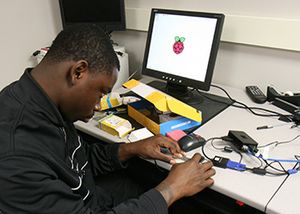
For most people, raspberry pie is a delicious dessert. But enter Catawba's hardware and systems software application class, and you will witness a new type of "dessert." For these students, the Raspberry Pi is the latest instrument for developing innovative projects using computer hardware and software and the latest trend in "textbooks."
Instead of purchasing traditional books to use in a class, each student purchases a Raspberry Pi, a low cost, credit card-sized computer that plugs into a computer monitor and uses a standard keyboard and mouse. The Pi enables students to explore computing and learn how to program in languages such as Python. With its limitless possibilities, students can write programs and develop projects for use with the Pi, having it perform simple tasks such as playing audio, getting feedback from a sensor, controlling a light emitting diode, or accessing a network.
Instructors Rodney Rymer and Shawn Moore led the pilot class that implemented the Raspberry Pi. During the semester, the students developed their project ideas, keeping in mind possible implications for college use. The project objectives were to build something using the unique hardware and software features of the Pi. Students were required to use hardware consisting of a minimum of four general purpose input/output components (two for input and two for output) and to use a software program to make the components work together in a meaningful way. They were encouraged to consider using two Pi devices communicating via a network to do something requiring the devices to cooperate with one another for extra points. Each student submitted a paper with details about their hardware and software design and gave a presentation in person or via a video.
One student wrote code for and used his Pi to develop audio to play the opening notes of the Deep Purple song "Smoke on the Water" using a wire whisk and three metal cups. Another team developed a motion sensor which can detect motion inside a home and send the audio feed to a computer at a remote location. Two Pis were used together to develop a weather device, with one Pi detecting barometric pressure, wind speed, moisture in the air, and temperature outside and the other displaying the readings on an inside monitor.
Currently, Catawba's digital signs are run by Raspberry Pis.
